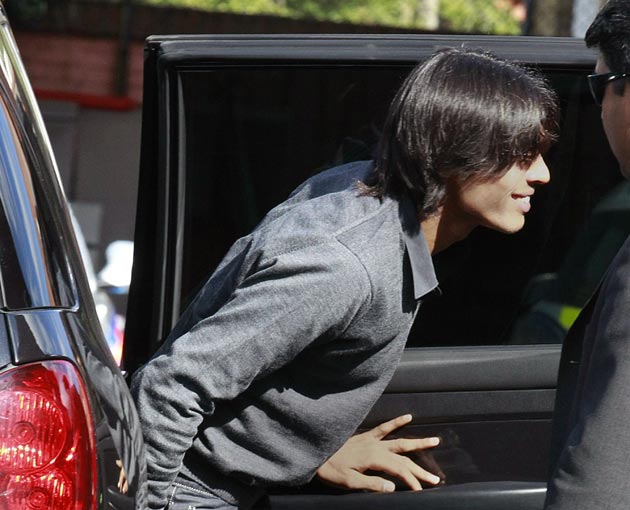Your support helps us to tell the story
From reproductive rights to climate change to Big Tech, The Independent is on the ground when the story is developing. Whether it's investigating the financials of Elon Musk's pro-Trump PAC or producing our latest documentary, 'The A Word', which shines a light on the American women fighting for reproductive rights, we know how important it is to parse out the facts from the messaging.
At such a critical moment in US history, we need reporters on the ground. Your donation allows us to keep sending journalists to speak to both sides of the story.
The Independent is trusted by Americans across the entire political spectrum. And unlike many other quality news outlets, we choose not to lock Americans out of our reporting and analysis with paywalls. We believe quality journalism should be available to everyone, paid for by those who can afford it.
Your support makes all the difference.The International Cricket Council has defended its decision to suspend the three players embroiled in the 'spot-fixing' scandal, insisting that there is no conspiracy against Pakistani cricket.
Last night The ICC took the decision to suspend captain Salman Butt and seamers Mohammad Asif and Mohammad Aamer after charging them with "various offences" under the governing body's code of conduct.
Pakistan high commissioner Wajid Shamsul Hasan this morning accused the ICC of "playing to the public gallery" by suspending the trio for their alleged involvement in a plot to deliberately ball three no-balls during the fourth Test against England at Lord's.
The three players were questioned by police this morning in relation to a criminal investigation which was launched after claims made in the News of the World that they were part of a spot-fixing scam aimed at defrauding illegal bookmakers.
Hasan claimed that he had received assurances from ICC chief executive Haroon Lorgat that the players would not be suspended while they were part of a criminal investigation at a meeting last night.
Hasan went on to claim that the ICC had "no authority to intervene" in the matter and added that he thought there was a "conspiracy" growing against a country that was stripped of its right to co-host the 2011 World Cup and has to play its "home" games abroad due to security fears.
Lorgat rejected those claims at a press conference at Lord's this morning.
Lorgat said: "This particular incident with the three players is unrelated to the challenge that we've got in keeping Pakistan involved as a full member of the International Cricket Council.
"So I wouldn't want to link the two, and I certainly wouldn't subscribe to the view that there is some sort of conspiracy around Pakistan cricket."
Lorgat also refuted the suggestion that he had assured the high commissioner that the trio would not be charged while the police investigation was underway.
Sir Ronnie Flanagan, chairman of the ICC's anti-corruption and security unit (ACSU), meanwhile, said at the press conference that the players had been suspended because they had "a really arguable case to answer."
Chaotic scenes outside the Pakistan high commission in London yesterday matched the turmoil that has been thrust upon the cricket-mad nation since the allegations against the players were made.
The cricketers needed a police escort to enter the building to hold talks with Pakistan Cricket Board (PCB) chairman Ijaz Butt and Hasan, who emerged to reveal that the players had protested their innocence to him.
During the meeting the players offered to withdraw from the squad for the upcoming limited overs series against England due to the "mental torture" they had endured since the allegations were made.
The magnitude of the crisis was not under-played by Lorgat, who described the allegations as equal in seriousness to those faced by former South Africa captain Hansie Cronje, who was convicted of accepting bribes to throw matches in 2000.
"I would think that in terms of corruption within the sport, this is the next worse or as big as Hansie Cronje," said Lorgat before promising that the ICC would act "decisively" and would not "tolerate any sort of corruption within the sport".
Flanagan, who has been in his role since July, said that the three players could face life bans if found guilty under Article 2 of the code.
"At the worst end of the scale, if guilt is found then the punishment can range right up to a life ban from the game," Northern Ireland's former chief constable said before warning that it would take some time before any investigation is concluded.
"I am certain that this will not take weeks," he added.
Flanagan said that he was considering adding to the ranks of the ACSU in a bid to stamp out any other potential corruption in the game.
He did, however, claim that the problem of 'spot-fixing' is not widespread within the sport.
"I do not see this as the tip of the iceberg," he continued.
Flanagan also denied that the fact that Pakistan's players receive less than their international counterparts should be regarded as an excuse for corrupt activity should they be found guilty.
He said: "Whatever they are paid or whatever they are not paid is absolutely no excuse for criminal or corrupt behaviour."

Join our commenting forum
Join thought-provoking conversations, follow other Independent readers and see their replies
Comments